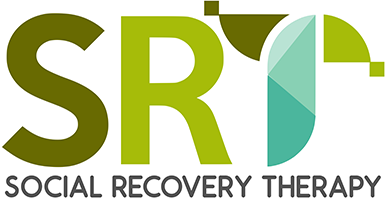Social Recovery Therapy in improving activity and social outcomes in early psychosis: Current evidence and longer term outcomes
Full Article David Fowler, Joanne Hodgekins, and Paul French Abstract Background Social Recovery Therapy (SRT) is a cognitive behavioural therapy which targets young people with early psychosis who have complex problems associated with severe social disability. This paper provides a narrative overview of current evidence for SRT and reports new data on a 2 year follow-up of participants recruited into the Improving Social Recovery in Early Psychosis (ISREP) trial. Method In the ISREP study 50 participants...
Social recovery therapy in combination with early intervention services for enhancement of social recovery in patients with first-episode psychosis (SUPEREDEN3): A single-blind, randomised controlled trial
Full Article David Fowler, Jo Hodgekins, Paul French, Max Marshall, Nick Freemantle, Paul McCrone, Linda Everard, Anna Lavis, Peter Jones, Tim Amos, Swaran Singh, Vimal Sharma, and Max Birchwood Abstract Background Provision of early intervention services has increased the rate of social recovery in patients with first-episode psychosis; however, many individuals have continuing severe and persistent problems with social functioning. We aimed to assess the efficacy of early intervention services augmented with social recovery...
Young people’s experiences of Social Recovery Cognitive Behavioural Therapy and treatment as usual in the PRODIGY trial
Full Article Brioney Gee, Caitlin Notley, Rory Byrne, Tim Clarke, Jo Hodgekins, Paul French, and David Fowler Abstract Aim The PRODIGY trial is an ongoing randomized controlled trial of Social Recovery Cognitive Behavioural Therapy (SRCBT), a new intervention designed to improve social functioning in young people at risk of long‐term social disability due to severe and complex mental health problems. The aim of this qualitative sub‐study was to understand trial participants’ experiences of SRCBT...
Prevention and treatment of long-term social disability amongst young people with emerging severe mental illness with social recovery therapy (The PRODIGY Trial): Study protocol for a randomised controlled trial
Full Article David Fowler, Paul French, Robin Banerjee, Garry Barton, Clio Berry, Rory Byrne, Timothy Clarke, Rick Fraser, Brioney Gee, Kathryn Greenwood, Caitlin Notley, Sophie Parker, Lee Shepstone, Jon Wilson, Alison R. Yung and Joanne Hodgekins Abstract Background Young people who have social disability associated with severe and complex mental health problems are an important group in need of early intervention. Their problems often date back to childhood and become chronic at an early...
Participant views on involvement in a trial of social recovery cognitive-behavioural therapy
Full Article Caitlin Notley, Rose Christopher, Joanne Hodgekins, Rory Byrne, Paul French and David Fowler Abstract Background The PRODIGY trial (Prevention of long term social disability amongst young people with emerging psychological difficulties, ISRCTN47998710) is a pilot trial of social recovery cognitive–behavioural therapy (SRCBT). Aims The PRODIGY qualitative substudy aimed to (a) explore individual experiences of participating in the pilot randomised, controlled trial (recruitment, randomisation, assessment) and initial views of therapy, and (b) to explore perceived...
CBT to address and prevent social disability in early and emerging psychosis
Full Article David Fowler, Paul French, Jo Hodgekins, Rebecca Lower, Ruth Turner, Simon Burton, and Jon Wilson Summary This chapter contains sections titled: The Problem Specific Characteristics of a Multisystemic Cognitive Behavioural Approach: The Need to Weave in Systemic and Assertive Case Management Practice in Delivering CBT to Promote Social Recovery Research Evidence Future and Ongoing Trials Time Use as the Primary Outcome A Cognitive Behavioural Model of Social Disability in Psychosis as...
CBT and recovery from psychosis in the ISREP Trial: Mediating effects of hope and positive beliefs on activity
Full Article Joanne Hodgekins and David Fowler Abstract Objective: Hope and positive self-concept have been highlighted as important components of recovery from psychosis. This study investigated the impact of a recovery-focused intervention on these dimensions, as well as their role as mediators of functional outcome. Methods: Seventy-seven participants in recovery from psychosis were recruited into a randomized controlled trial of social recovery–focused cognitive-behavioural therapy (SRCBT). The primary outcome was hours spent weekly in structured...
Cognitive behaviour therapy for improving social recovery in psychosis: A report from the ISREP MRC Trial Platform study (Improving Social Recovery in Early Psychosis)
Full Article David Fowler, Joanne Hodgekins, M. Painter, Tony Reilly, C. Crane, Iain Macmillan, Miranda Mugford, Tim Croudace and Peter B. Jones Abstract Background This study reports on a preliminary evaluation of a cognitive behavioural intervention to improve social recovery among young people in the early stages of psychosis showing persistent signs of poor social functioning and unemployment. The study was a single-blind randomized controlled trial (RCT) with two arms, 35 participants receiving cognitive...
Cognitive behaviour therapy for improving social recovery in psychosis: Cost-effectiveness analysis
Full Article Garry R. Barton, Jo Hodgekins, Miranda Mugford, Peter B. Jones, Tim Croudace, and David Fowler A randomised trial was conducted in order to estimate the clinical and cost-effectiveness of social recovery orientated cognitive behavioural therapy (SRCBT) for people diagnosed with psychosis, compared to case management alone (CMA). The mean incremental health and social care cost, and the mean incremental quality adjusted life year (QALY) gain, of SRCBT was calculated over...
